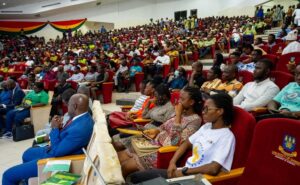The government has intensified its advocacy for the youth to venture into agriculture and its related businesses.
Through the Ministry of Food and Agriculture and the Youth Employment Agency (YEA), 200,000 youth are to be permanently employed in agribusiness.
Dubbed Youth in Agriculture, interested individuals can log on to www.apply.yea.gov.gh to register to participate.
The Minister for Food and Agriculture, Bryan Acheampong, who announced this on Wednesday, October 18, 2023, added that the initiative was under the banner Planting for Food and Jobs 2.0.
He said that each individual would cultivate an average farm size of 10 acres, explaining that that would mean putting over 400,000 hectares of arable land under cultivation.
The target commodities for this intervention, as the minister mentioned, would include maize, rice, and vegetables.

“However, if we put all 400,000 hectares of land under rice cultivation alone, we would exceed our self-sufficiency production target of 1.834 million tons,” the Abetifi Legislator asserted.
He noted that, in addition to lands already secured by YEA for this purpose, MoFA will make land available from agriculture zones and economic enclaves to be established under PFJ 2.0.
LUCRATIVE
At the Cedi Conference Centre, University of Ghana, Legon, where the event took place, President Akufo-Addo and the Minister for Food and Agriculture, Bryan Acheampong, availed themselves of an informal discussion with the youth on agribusiness.
The about 1,000-seater auditorium had been filled for the launch of the Presidential Conference on Youth in Agriculture.
The President, responding to a question on the motivation there was to attract the youth into farming, reminded them that farming was not new in Ghana and cited the benefits cocoa had brought the nation.
He told the youth that when he was growing up, the richest people were cocoa farmers, adding that now technology has made the sector very attractive and lucrative.
The President encouraged the youth to consider agribusiness in planning their future, as it was a sustainable source of income while feeding the nation.
“Many parts of the world, when you go there, the people who are rich are the farmers,” the President said, adding that the government, through the Ministry of Food and Agriculture, has set up several incentives.
ILLUSTRATION
The agriculture minister said that in addition to job creation, the funding mechanism of the PFJ 2.0 will significantly change the financial well-being of participating youth farmers.
In a bid to convince the youth to try the initiative, we used maize cultivation to illustrate the point. He said that it will cost GH¢5,871 to produce 1 acre of maize.
The major cost items are agro-inputs (seeds, fertilizers, plant protection chemicals), and mechanisation services, which together constitute 55% of the total cost and 72% of direct production costs.
At an average yield of 2.5 MT per acre, total production per acre will be 50 bags (50kg per bag), and based on a conservative farmgate price of GH¢220 per bag, total revenue per acre will be GH¢11,000.
Based on the input recovery arrangement under the input credit system, the farmer will be expected to pay back the inputs provided with 19 bags of maize and keep 31 bags. This translates to farmer revenue of GH¢6,820 (62% of total revenue).
Now the farmer is expected to pay for his or her own labor, which is estimated at GH¢1,350.
If we net out this cost or investment, the young farmer will make a net profit of GH¢5,444. This implies a return on investment of 403%.
To put this in perspective, this means that for each cropping season, the young farmer makes a monthly net income of GH¢907.33 per acre. For the proposed 10 acres, this is equivalent to GH¢9,073 per month.










